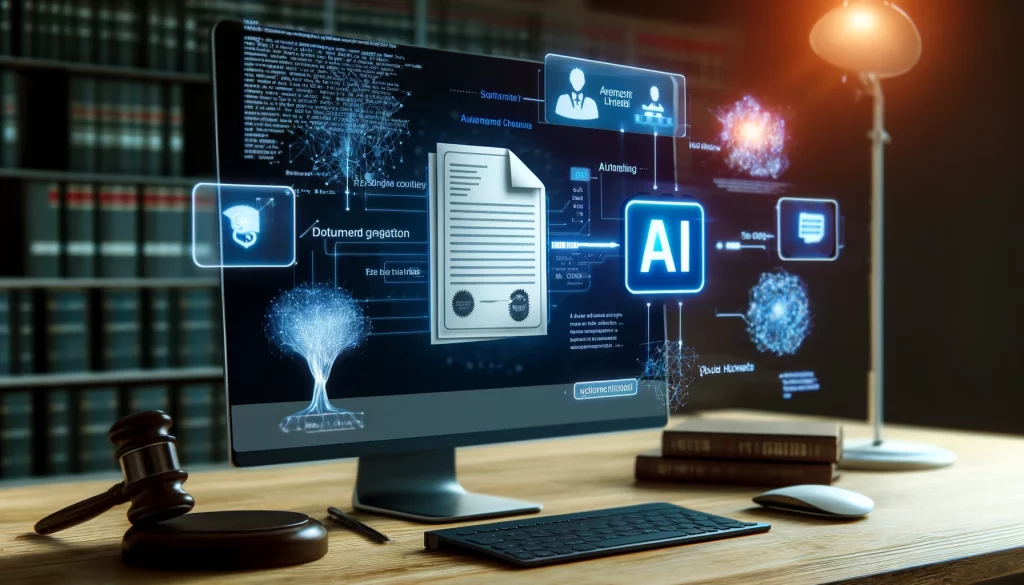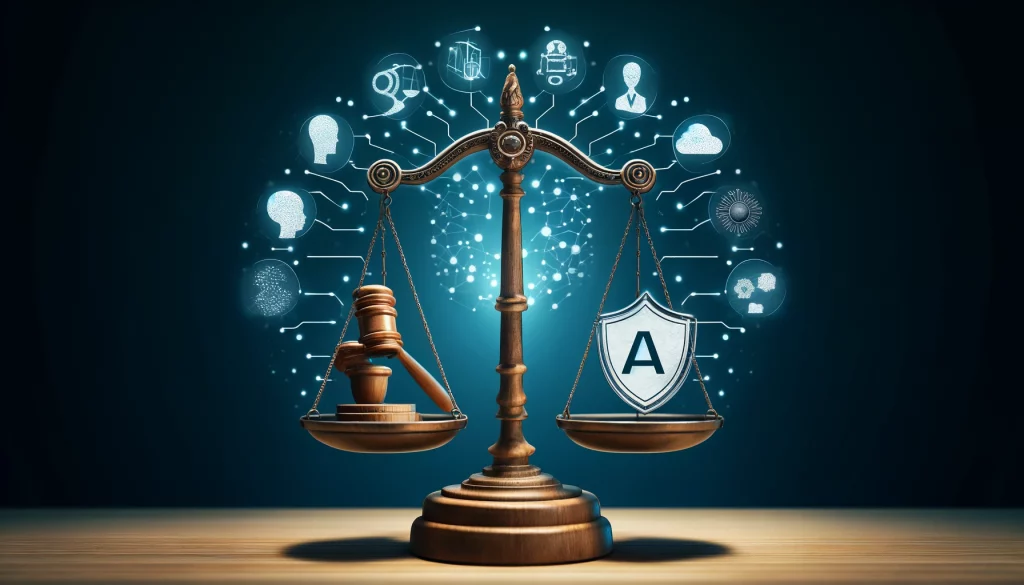Introduction
The dawn of Artificial Intelligence (AI) has ushered in a transformative era across multiple industries, redefining the paradigms of operation, efficiency, and innovation. Among these, the legal sector stands out for its complex interplay of procedural intricacies, the paramount importance of precision, and an overwhelming dependence on document-centric processes. Traditionally bogged down by voluminous paperwork and manual labor, the legal profession is ripe for the disruptive influence of AI, particularly in the realms of document creation and management.
In this technological renaissance, platforms like Counsel Copilot emerge as harbingers of change, epitomising the potential of AI to streamline the labyrinthine processes inherent in legal practice. By leveraging advanced AI algorithms, Counsel Copilot not only simplifies the drafting and management of legal documents but also introduces unprecedented levels of accuracy and efficiency, setting a new benchmark for legal operations.
This exploration delves into the transformative impact of AI on legal document creation and management. It navigates through the historical evolution of document management in the legal sphere, highlights the revolutionary features introduced by AI technologies, and examines the pivotal role of Counsel Copilot in this paradigm shift. Furthermore, it contemplates the challenges and ethical considerations inherent in AI adoption, culminating in a forward-looking perspective on the future trajectory of AI within the legal profession.
As we embark on this journey, we unravel how AI is not merely an adjunct to the legal profession but a fundamental force reshaping its very fabric, heralding a future where legal practices are more efficient, error-resistant, and aligned with the dynamic demands of the modern world.
The Evolution of Legal Document Management

The journey of legal document management is a tale of gradual evolution, marked by incremental innovations and transformative leaps. This odyssey from the annals of manual, paper-laden processes to the digital revolution, and ultimately to the integration of Artificial Intelligence, reflects the legal profession’s adaptive strategies in response to the changing landscapes of technology and societal needs.
From Paper to Pixels: The Pre-Digital Era
Historically, legal document management was synonymous with physical storage – towering file cabinets, voluminous binders, and rooms dedicated to archiving. This era was characterized by manual drafting, physical signatures, and in-person consultations. The process was not only time-consuming but also prone to human error, with the added risks of physical damage and loss. The inefficiency of this system, coupled with the growing volume of legal documentation, necessitated a shift towards more sustainable and efficient practices.
The Digital Shift: Early Adoption of Technology
The advent of computers and digital storage marked the first significant shift in legal document management. Word processing software replaced typewriters, and digital archives began to supplement, if not replace, physical storage. This period saw the legal profession taking tentative steps towards digitization, with email becoming a standard mode of communication and digital databases facilitating easier retrieval of documents. However, this was just the tip of the iceberg. The digital shift improved accessibility and organization but did little to enhance the drafting process or the management of complex document workflows.
AI Integration: A Paradigm Shift
The integration of Artificial Intelligence into legal document management represents a seismic shift, transcending mere digitization to revolutionize the very mechanisms of document creation, storage, and retrieval. AI technologies, equipped with natural language processing and machine learning capabilities, have introduced automated document drafting, intelligent search functionalities, and predictive analytics. This era is characterized by platforms like Counsel Copilot, which harness AI to offer dynamic templates, clause libraries, and semantic search capabilities, thereby reducing drafting time, minimizing errors, and improving overall efficiency in document management.
AI’s introduction into legal document management is not just an upgrade; it’s a redefinition of how legal professionals interact with documents. It enables a proactive approach to document management, where predictive analytics can foresee needs and suggest actions, and intelligent systems can learn from interactions to continuously improve efficiency and accuracy.
The evolution of legal document management, from its rudimentary beginnings to the AI-driven innovations of today, reflects the legal profession’s journey towards embracing technology to meet the demands of an increasingly complex world. This historical context sets the stage for a deeper exploration of the specific features and benefits that AI brings to legal document management, epitomized by platforms like Counsel Copilot.
Key Features of AI in Legal Document Management
The integration of Artificial Intelligence (AI) into legal document management has heralded a new era of efficiency, precision, and innovation, fundamentally transforming the landscape of legal practices. The adoption of AI technologies has equipped legal professionals with tools that not only streamline routine tasks but also enhance the accuracy and speed of legal operations. This section delves into the core features that AI brings to legal document management, with a focus on automated document creation, intelligent search and retrieval, security and compliance, and customization and scalability.
Automated Document Creation
One of the most transformative features of AI in legal document management is the ability to automate the creation of legal documents. AI-driven platforms like Counsel Copilot leverage natural language processing (NLP) and machine learning algorithms to generate templates and drafts based on specific legal requirements and precedents. This automation significantly reduces the time and effort required for drafting, enabling legal professionals to focus on more complex and strategic aspects of their work. Moreover, AI-driven document creation ensures a higher degree of accuracy and consistency, minimizing the risk of human errors.
- Dynamic Templates and Clause Libraries: AI systems offer dynamic templates that adapt to the specific needs of a case or legal process, along with extensive clause libraries that can be customized and integrated into documents as needed. This flexibility ensures that legal documents are not only standardized but also tailored to the unique requirements of each case.
Intelligent Document Search and Retrieval
Another critical advancement introduced by AI is the capability for intelligent document search and retrieval. Traditional keyword-based searches often fall short in understanding the context or semantic meaning behind legal texts. AI-enhanced systems employ NLP to interpret the intent and context of queries, enabling more accurate and relevant search results.
- Semantic Search Capabilities: By understanding the context and relationships between terms, AI can retrieve documents that are not only keyword matches but also contextually relevant, streamlining the process of finding precedent cases or specific legal arguments.
Security and Compliance
In the legal domain, where confidentiality and compliance are paramount, AI plays a crucial role in enhancing document security and ensuring adherence to regulatory standards. AI algorithms can monitor and manage access controls, audit trails, and encryption protocols to safeguard sensitive information.
- Automated Compliance Checks: AI systems can be trained to recognize and enforce compliance with legal standards and regulations, ensuring that all documents adhere to the required guidelines and reducing the risk of non-compliance.
Customization and Scalability
The versatility of AI in legal document management extends to its ability to customize solutions to fit the varying needs of different legal practices and to scale operations according to case volume and complexity.
- Adaptive Systems: AI platforms are designed to learn and adapt over time, continuously improving their efficiency and accuracy based on user interactions and feedback. This ensures that legal practices can rely on AI systems that evolve in tandem with their growing and changing needs.
The incorporation of AI into legal document management through features like automated document creation, intelligent search and retrieval, and enhanced security protocols represents a significant leap forward for the legal profession. Platforms like Counsel Copilot are at the forefront of this revolution, leveraging AI to provide legal professionals with powerful tools that enhance productivity, ensure accuracy, and maintain compliance, thus reshaping the future of legal practices.
Case Study: Counsel Copilot

Counsel Copilot stands as a testament to the transformative power of Artificial Intelligence (AI) in the realm of legal document management. As a pioneering platform, it encapsulates the advanced capabilities of AI to streamline, enhance, and revolutionize traditional legal processes. This case study delves into the inception, core functionalities, and real-world impacts of Counsel Copilot, illustrating its significant contributions to the legal profession.
Overview of Counsel Copilot
Counsel Copilot was conceived with the vision of harnessing AI to address the inherent complexities and inefficiencies in legal document creation and management. Recognizing the potential for AI to bring about a paradigm shift in legal practices, the platform was designed to offer an intuitive, efficient, and reliable solution for legal professionals. By integrating sophisticated AI algorithms with user-friendly interfaces, Counsel Copilot aims to empower lawyers, paralegals, and law firms with cutting-edge tools to enhance their productivity and accuracy.
How Counsel Copilot Uses AI
Counsel Copilot employs a suite of AI technologies to deliver its innovative services. Central to its operation is the use of Natural Language Processing (NLP), which enables the platform to understand, interpret, and generate legal language with remarkable precision. Machine Learning algorithms allow Counsel Copilot to learn from user interactions, continually refining its processes and outputs based on real-world usage.
- Automated Document Drafting: By leveraging NLP, Counsel Copilot automates the drafting of legal documents, offering tailored templates and clauses that can be dynamically adjusted to suit specific case requirements.
- Intelligent Search Functionality: The platform incorporates advanced search algorithms capable of semantic understanding, allowing users to efficiently locate relevant documents, precedents, and legal materials based on contextual inquiries.
- Data Analytics and Insights: Machine Learning enables Counsel Copilot to provide actionable insights into legal trends, document usage patterns, and operational efficiencies, aiding legal professionals in making informed decisions.
Benefits for Legal Professionals
The integration of Counsel Copilot into legal practices brings a multitude of benefits, fundamentally enhancing how legal work is conducted:
- Efficiency and Time Savings: Automated document drafting and intelligent search capabilities significantly reduce the time required for document-related tasks, freeing legal professionals to focus on strategic aspects of their cases.
- Increased Accuracy and Consistency: AI-driven processes minimize the risk of human error, ensuring that legal documents are accurate, consistent, and compliant with relevant laws and regulations.
- Scalability and Customization: The platform’s AI algorithms adapt to the unique needs and workflows of different legal practices, offering scalable solutions that grow in tandem with law firms.
Real-World Applications and Success Stories
Counsel Copilot has been instrumental in transforming the operations of numerous legal practices. Law firms have reported substantial improvements in document turnaround times, with a marked reduction in errors and revisions. The platform’s intuitive interface and intelligent recommendations have been praised for enhancing the decision-making process, allowing legal professionals to navigate complex cases with greater confidence and insight.
In one notable instance, a mid-sized law firm specializing in corporate law utilized Counsel Copilot to overhaul their contract drafting process. The firm experienced a 40% reduction in drafting time, along with a significant decrease in contractual disputes due to the increased accuracy and clarity of documents produced by the platform.
Challenges and Ethical Considerations

While the integration of Artificial Intelligence (AI) in legal document management, as exemplified by platforms like Counsel Copilot, offers transformative benefits, it also introduces a set of challenges and ethical considerations. These issues demand careful deliberation to ensure that the adoption of AI in the legal domain is responsible, equitable, and aligned with the profession’s ethical standards.
Addressing Potential Biases in AI
One of the paramount concerns in the deployment of AI systems, including those in legal document management, is the risk of inherent biases. AI algorithms, by their nature, learn from vast datasets to make predictions or decisions. If these datasets contain biases, the AI’s outputs can inadvertently perpetuate or even exacerbate these biases.
- Bias Mitigation Strategies: Ensuring that AI systems like Counsel Copilot are trained on diverse and representative datasets is crucial. Regular audits and updates of AI models can help identify and mitigate biases, ensuring that the AI’s assistance in document drafting and management remains fair and impartial.
Ethical Concerns Related to Automation
The increasing reliance on AI for tasks such as document drafting and decision-making raises ethical questions about the role of human judgment in the legal process. While AI can enhance efficiency and accuracy, the unique insights and ethical considerations that human professionals bring to legal work cannot be entirely replicated by machines.
- Maintaining Human Oversight: It’s essential to maintain a balance where AI tools are used to augment, rather than replace, human expertise in legal practices. Legal professionals should remain actively involved in reviewing and finalizing AI-generated documents and decisions, ensuring that the final outputs align with ethical standards and the nuances of the law.
Data Privacy and Protection
With AI systems processing and storing vast amounts of sensitive legal documents, ensuring the privacy and security of this data is paramount. Breaches or misuse of this data could have severe implications for client confidentiality and the integrity of legal processes.
- Robust Security Measures: Implementing stringent data protection measures, including encryption, access controls, and regular security audits, is vital in safeguarding sensitive information within AI-powered legal document management platforms.
The Future Role of Legal Professionals
As AI continues to advance, there’s an ongoing debate about the future role of legal professionals and the potential for AI to displace certain legal jobs. This prospect raises concerns about the preservation of employment opportunities and the importance of human-centric skills in the legal field.
- Emphasizing Soft Skills and Human Judgment: While AI can handle many procedural and analytical tasks, the empathetic, creative, and strategic aspects of legal work remain uniquely human. Legal education and training may need to evolve to emphasize these irreplaceable human skills, ensuring that legal professionals continue to play an indispensable role in the justice system.
The Future Outlook

The intersection of Artificial Intelligence (AI) and legal document management is poised at a dynamic frontier, with emerging trends and technologies promising to further reshape the landscape of legal practices. As platforms like Counsel Copilot continue to set new benchmarks, the future outlook for AI in the legal domain is marked by both exhilarating possibilities and considerations that necessitate thoughtful navigation. This section explores the anticipated advancements in AI technologies, their implications for legal professionals, and the evolving role of AI-driven platforms in shaping the future of legal document management.
Emerging Trends and Technologies
- Advanced Natural Language Understanding (NLU): Future developments in NLU will enable AI systems to comprehend legal documents with even greater depth and nuance, facilitating more sophisticated document analysis and drafting capabilities.
- Predictive Analytics: AI will increasingly be able to predict legal outcomes based on historical data, assisting legal professionals in strategy formulation and risk assessment.
- Blockchain Integration: The incorporation of blockchain technology could enhance the security and verifiability of legal documents, introducing immutable record-keeping and smart contracts into legal practices.
- Voice-Activated Assistants: As voice recognition technology advances, AI-powered legal assistants could become more prevalent, allowing for hands-free document management and information retrieval.
Implications for Legal Professionals
The advancements in AI will necessitate a shift in the skill set and roles of legal professionals. The focus will likely transition towards strategic decision-making, client relations, and complex negotiations, with AI handling a significant portion of routine document-related tasks. Continuous education and adaptation will be crucial for legal professionals to leverage AI tools effectively and remain competitive in this evolving landscape.
The Role of Platforms Like Counsel Copilot
Platforms that spearhead the integration of AI in legal practices, such as Counsel Copilot, will play a pivotal role in defining the trajectory of the profession. By continuously innovating and adapting to the latest AI technologies, these platforms will not only enhance the efficiency and accuracy of legal document management but also redefine the nature of legal work itself.
- Driving Innovation: As a leader in AI-driven legal solutions, Counsel Copilot will likely continue to introduce new features and capabilities, setting industry standards and driving the adoption of AI in legal practices worldwide.
- Empowering Legal Professionals: By providing tools that automate and optimize document management, platforms like Counsel Copilot empower legal professionals to focus on higher-value aspects of their work, thus elevating the quality and impact of legal services.
- Shaping Ethical and Regulatory Standards: As AI becomes more entrenched in legal practices, platforms at the forefront of this integration will have a significant influence on the development of ethical guidelines and regulatory frameworks governing the use of AI in the legal field.
Conclusion
The future of legal document management is inextricably linked with the advancements in AI, with platforms like Counsel Copilot leading the charge towards a more efficient, accurate, and innovative legal profession. As we look ahead, the ongoing evolution of AI technologies promises not only to enhance the capabilities of legal professionals but also to redefine the essence of legal work in the digital age. Embracing these changes with a commitment to ethical standards, continuous learning, and human-centric values will ensure that the legal profession remains resilient and relevant in the face of technological transformation.




